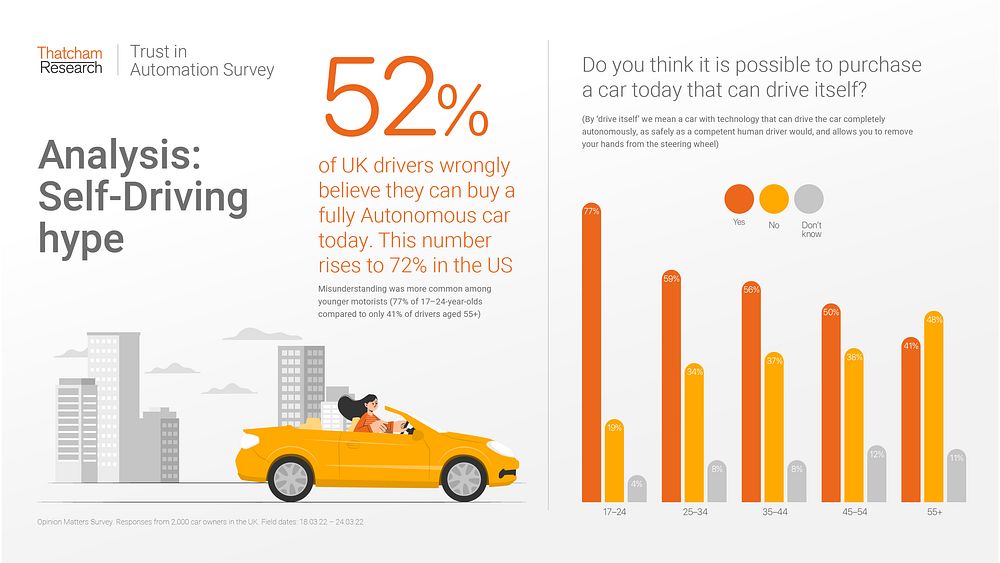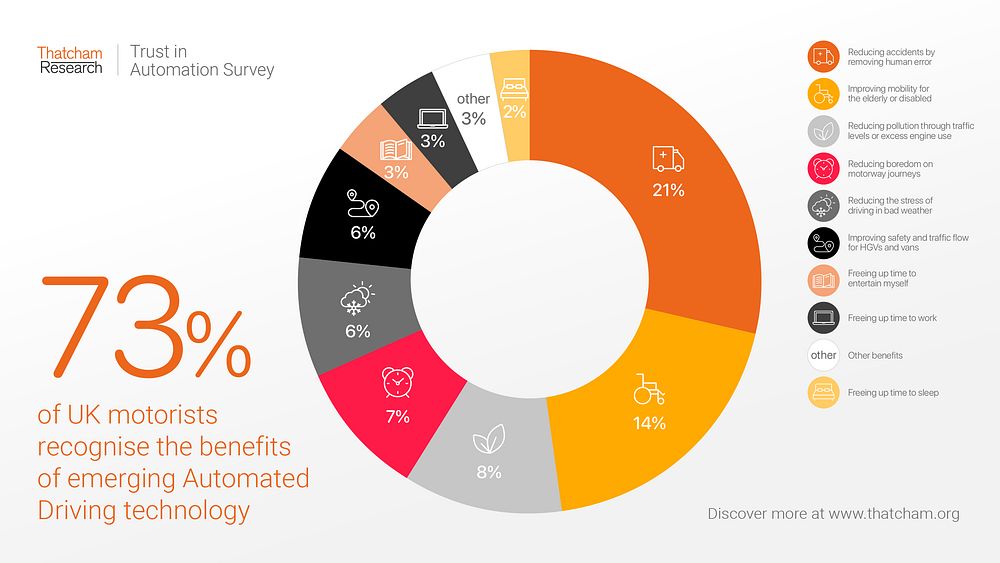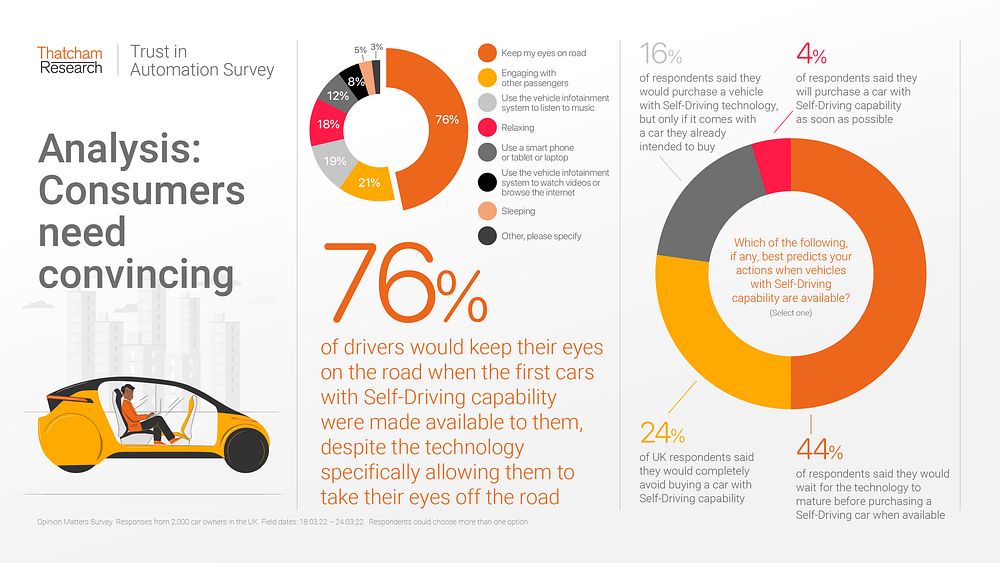Thatcham Research is launching findings from its Trust in Automation consumer study[1], which has revealed that just over half of UK drivers think that they can buy a fully Autonomous[2]car today.
This is despite the fact that only Assisted Driving systems, which require driver support, are currently available in the UK.
“Realising the government’s stated safety ambition for Automated vehicles is dependent on driver education,” comments Matthew Avery, chief strategic research officer, Thatcham Research. “This can’t just be lip service. With more than half of the UK public believing that Autonomous driving is here today, the perception is racing ahead of the reality. This demonstrates just how much work needs to be done to set realistic consumer expectations of the first vehicles offering limited self-driving functionality, when they do become available. Put simply, the benefits of Automation will not be delivered if people don’t fully understand its limitations.”
UK roads will potentially see vehicles with ‘self-driving capability’ by 2025, according to a recent Government announcement. However, the first iterations of the technology, known as ALKS[3](Automated Lane Keeping Systems) can only be activated on motorways with the driver needing to resume control as required.
The false impression regarding the current availability of self-driving technology was found to be more prevalent in younger age groups (77% of 17–24-year-olds) than it was amongst those aged 55+ (41%).
The figure rises to an astonishing 72% of the 2,000 drivers also surveyed in the United States.[i]

Drivers recognise potential societal benefit
In addition, the Trust in Automation study has revealed that 73% of UK motorists recognise the benefits of emerging Automated Driving technology.[ii]
When asked what they consider the key benefits of the technology to be, the most popular option was improving safety through removing human error (21%), followed by improving mobility for the elderly and disabled (14%) and reducing pollution through fewer traffic jams and unnecessary acceleration / deceleration (8%).
Very few drivers saw freeing up time to work (3%), entertain themselves (3%) or sleep (2%) as advantages to Automation.

“Drivers are beginning to recognise that Automation can deliver significant societal benefit in terms of safety, mobility and sustainability,” comments Avery. “However, with safety being such a high priority for drivers, accidents that do occur will be scrutinised under the media microscope, quickly eroding consumer confidence.
“The industry must be cautious with the language employed to sell Automation and drivers must be made aware of the limitations of systems, a small number of which are already on sale and in-use in Germany with ALKS fitted. This is vital not only during the early stages of adoption but also as we move towards fuller levels of Automation.”
In November 2021 the Society of Motor Manufacturers and Traders (SMMT) launched guiding principles to ensure that Automated vehicle marketing is clear and comprehensible.
Developed in partnership with the Centre for Connected and Autonomous Vehicles’ AV-DRiVE Group[4], the principles provide an outline for responsible advertising and communication relating to Automated vehicles and their capabilities.
“It’s crucial that the SMMT’s existing guidelines are adhered to, along with the subsequent principles currently in development with the AV-DRiVE Group for ALKS specifically. This is an ongoing communication through the stages of Automation at various touchpoints – encompassing carmaker marketing, how the systems interact with drivers, and how system capability is described in dealerships,” comments Avery.
Watching brief: consumers need convincing
Even though drivers were most likely to see safety as a key benefit of Automation, the survey found that 76% of drivers would keep their eyes on the road when the first cars with self-driving capabilities like ALKS were made available to them.
This is despite respondents being told that the technology would specifically allow them to take their eyes off the road[5].
Avery comments: “Even when told they can rely on the system and take their eyes off the road, most people would still prefer to oversee the driving task. This suggests that although safety is seen by many to be a key benefit of Automation, trust and confidence needs to be nurtured over time.”
In positive news for carmakers looking to offer limited Automation to customers, 76% of drivers said they would not totally discount the idea of buying a vehicle with self-driving capability – but the majority are keen to see the technology prove itself before they give it the green light:
- 44% of respondents said they would wait for the technology to mature before purchasing a self-driving car when available
- 16% of respondents said they would purchase a vehicle with self-driving technology, but only if it comes with a car they already intended to buy
- 4% of respondents said they will purchase a car with self-driving capability as soon as possible
- 24% of UK respondents said they would completely avoid buying a car with self-driving capability
“With the majority of drivers stating that they intend to keep a watching brief on how the technology behaves on the roads, it’s vital that all industry stakeholders come together to instil trust in Automation by ensuring motorists have a firm grasp of their legal obligations and the performance limitations of systems,” said Avery.

Industry comment on Trust in Automation
Steve Gooding, director, RAC Foundation, said:
“This research provides some valuable insights for policy-makers keen to usher in the start of automated driving.
“Given all the hype surrounding automated car technology, particularly coverage of autonomous cars and taxis operating in the US, it isn’t surprising that some people think self-driving cars are already available on the UK market.
“The most important point that this research highlights is the need to ensure drivers understand the limits of automated options when they do first appear on UK roads, particularly where the system requires the driver to stand ready to re-take control.”
Jonathan Dye, chair of the Automated Driving Insurer Group (ADIG) and head of underwriting, QBE said:
“The research clearly highlights it is critical for the safe deployment of self-driving vehicles that drivers (or in the future ‘users in charge’) have a clear understanding of a vehicle’s capabilities and therefore their obligations regarding its safe use.
“In addition to education and collaboration across industry sectors, a key element will be the sharing of data and the transparency of what each specific vehicle is capable of at a point in time. With some models likely to have the self-driving technology as ‘optional’, or as an ‘over the air update’, meaning it would be possible to change a vehicle’s capabilities overnight, it’s imperative the driver has a full and clear understanding of the vehicle’s limitations post update and that they are adequately protected by purchasing an appropriate insurance product.”
SOURCE: Thatcham Research
